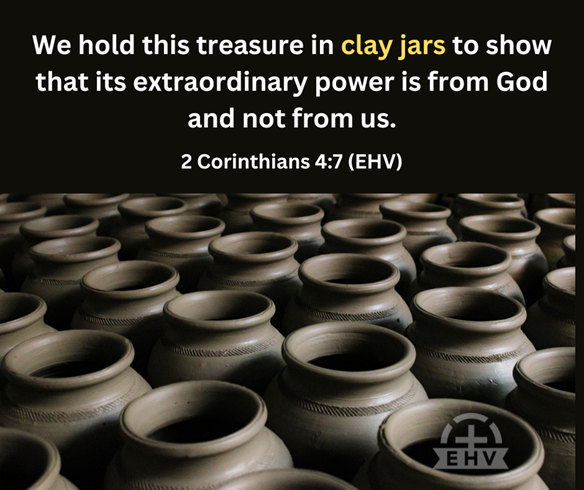March 31st, 2025
122. Treasure in Clay Jars
In 2 Corinthians 4:7 what does it mean that we have a treasure in clay jars?
In the parable about clay jars, or in traditional terminology “jars of clay,” the gospel is the treasure. The messengers who carry and proclaim the gospel are fragile, like clay jars. The real power to work faith did not come from Paul or the apostles or from us; it came from God.
What does this parable about jars of clay show us about messengers of the Word? We have a treasure but it is in jars of clay. All the jars can do, their only responsibility, is to “store and pour.”
Clay storage jars are meant to store food, and their job is to keep the food clean, but they are meant to do more. They are meant to pour out food to the hungry. Jars of clay do not serve their chief purpose when they are in a warehouse or buried in the ground. If human jars of clay just store the gospel, if they just hide the gospel, they are not serving their main purpose. The jars that hid the Dead Sea Scrolls for 2000 years did a good thing for archaeology, but the precious scrolls were for all practical purposes lifeless during the 2000 years they lay hidden in a cave. Our Bibles are for all practical purposes lifeless when they lie on a coffee table or sit on a bookshelf. Their chief purpose is accomplished only when they are in pouring mode, not storing mode. Preserving the Word is good and necessary. Pouring out the Word is even better. The Bible is the power of God onto salvation. The Bible functions as the power of God onto salvation only when it is read, heard, and remembered. The jars of clay do not control, nor are they responsible for how often the Word converts a person who was dead in sin to life in Christ. But the jars of clay do have some control and some responsibility for how often the Word is poured out so it can be heard and remembered.
Clay storage vessels can’t make the food they contain any better than it already is, but blemishes or defects in the jar do not take away the life-giving power of the food.
Moral and spiritual weaknesses of the messengers can turn people off and prevent them from hearing the Word. We won’t address that issue here. The ability we jars of clay have to pour out the Word is also limited by physical weakness. Jars of clay are fragile. They break.
What is the biggest hindrance to your service to the Lord? I would say it is hands-down your need for sleep. How much more could you do to serve the Word if you did not have to sleep a third of your life away?
And then there is health and age. Even as our inner self grows stronger, our outer self is wasting away. After forty years of preaching and teaching and serving in a congregation, a pastor might begin to feel that now he is beginning to have enough knowledge and experience to have a somewhat of a handle on this task. How much different would your life as a teenager be if you could live it over again with the knowledge and experience you have now? How much different would your ministry be if you could start it again with forty years of study and experience? But you can’t. Age will erode your ability, and death will sweep you away. And a new jar of clay will have to start from scratch where you started 40 or 50 years ago, eager and strong, but with so much to learn, much of it perhaps to be learned the hard way.
But there is a comfort even in this. If God has passed on the gospel in jars of clay ever since the Fall, through the nearly total apostasy of the world in the days of Noah, through the great Flood, through era after era of pride and apostasy, through Israel’s unfaithfulness, through horrors of persecution, through the nearly total corruption of the Christian church, he is not going to stop now.
Even when jars of clay lie broken and buried in the ground, their work continues even after they themselves are dust, because the essence of their work was never them but the message they carried, and they have passed that message on to others who will in turn pass it on to others, and so it will continue till Christ returns.
And jars of clay, though they lie broken in the ground, do not cease to be. The broken pieces of pottery lie in the ground waiting for the archaeologist to put them back together. And so it is also with us jars of clay. We lie in the ground for a while, waiting for the pieces to be put back together again into a vessel without blemish that will serve in honor and glory forever.
We have this treasure in jars of clay
to show that this all-surpassing power is
from God and not from us.

This article, prompted by the picture above, is adapted from a 2015 conference paper, Story Time with Professor Brug, which is available from the Wisconsin Lutheran Seminary online library. It expresses our goal for the EHV and for the jars of clay who store it and who pour it out.